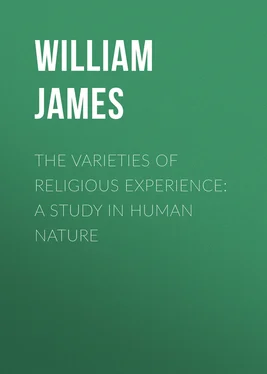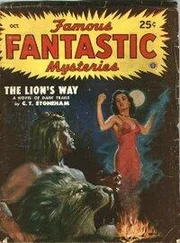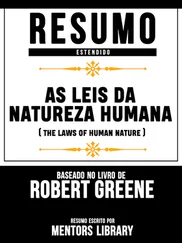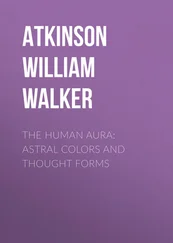William James - The Varieties of Religious Experience - A Study in Human Nature
Здесь есть возможность читать онлайн «William James - The Varieties of Religious Experience - A Study in Human Nature» — ознакомительный отрывок электронной книги совершенно бесплатно, а после прочтения отрывка купить полную версию. В некоторых случаях можно слушать аудио, скачать через торрент в формате fb2 и присутствует краткое содержание. Жанр: foreign_prose, foreign_religion, Философия, foreign_psychology, foreign_antique, на английском языке. Описание произведения, (предисловие) а так же отзывы посетителей доступны на портале библиотеки ЛибКат.
- Название:The Varieties of Religious Experience: A Study in Human Nature
- Автор:
- Жанр:
- Год:неизвестен
- ISBN:нет данных
- Рейтинг книги:4 / 5. Голосов: 1
-
Избранное:Добавить в избранное
- Отзывы:
-
Ваша оценка:
- 80
- 1
- 2
- 3
- 4
- 5
The Varieties of Religious Experience: A Study in Human Nature: краткое содержание, описание и аннотация
Предлагаем к чтению аннотацию, описание, краткое содержание или предисловие (зависит от того, что написал сам автор книги «The Varieties of Religious Experience: A Study in Human Nature»). Если вы не нашли необходимую информацию о книге — напишите в комментариях, мы постараемся отыскать её.
The Varieties of Religious Experience: A Study in Human Nature — читать онлайн ознакомительный отрывок
Ниже представлен текст книги, разбитый по страницам. Система сохранения места последней прочитанной страницы, позволяет с удобством читать онлайн бесплатно книгу «The Varieties of Religious Experience: A Study in Human Nature», без необходимости каждый раз заново искать на чём Вы остановились. Поставьте закладку, и сможете в любой момент перейти на страницу, на которой закончили чтение.
Интервал:
Закладка:
Stoic insensibility and Epicurean resignation were the farthest advance which the Greek mind made in that direction. The Epicurean said: “Seek not to be happy, but rather to escape unhappiness; strong happiness is always linked with pain; therefore hug the safe shore, and do not tempt the deeper raptures. Avoid disappointment by expecting little, and by aiming low; and above all do not fret.” The Stoic said: “The only genuine good that life can yield a man is the free possession of his own soul; all other goods are lies.” Each of these philosophies is in its degree a philosophy of despair in nature's boons. Trustful self-abandonment to the joys that freely offer has entirely departed from both Epicurean and Stoic; and what each proposes is a way of rescue from the resultant dust-and-ashes state of mind. The Epicurean still awaits results from economy of indulgence and damping of desire. The Stoic hopes for no results, and gives up natural good altogether. There is dignity in both these forms of resignation. They represent distinct stages in the sobering process which man's primitive intoxication with sense-happiness is sure to undergo. In the one the hot blood has grown cool, in the other it has become quite cold; and although I have spoken of them in the past tense, as if they were merely historic, yet Stoicism and Epicureanism will probably be to all time typical attitudes, marking a certain definite stage accomplished in the evolution of the world-sick soul. 75They mark the conclusion of what we call the once-born period, and represent the highest flights of what twice-born religion would call the purely natural man—Epicureanism, which can only by great courtesy be called a religion, showing his refinement, and Stoicism exhibiting his moral will. They leave the world in the shape of an unreconciled contradiction, and seek no higher unity. Compared with the complex ecstasies which the supernaturally regenerated Christian may enjoy, or the oriental pantheist indulge in, their receipts for equanimity are expedients which seem almost crude in their simplicity.
Please observe, however, that I am not yet pretending finally to judge any of these attitudes. I am only describing their variety.
The securest way to the rapturous sorts of happiness of which the twice-born make report has as an historic matter of fact been through a more radical pessimism than anything that we have yet considered. We have seen how the lustre and enchantment may be rubbed off from the goods of nature. But there is a pitch of unhappiness so great that the goods of nature may be entirely forgotten, and all sentiment of their existence vanish from the mental field. For this extremity of pessimism to be reached, something more is needed than observation of life and reflection upon death. The individual must in his own person become the prey of a pathological melancholy. As the healthy-minded enthusiast succeeds in ignoring evil's very existence, so the subject of melancholy is forced in spite of himself to ignore that of all good whatever: for him it may no longer have the least reality. Such sensitiveness and susceptibility to mental pain is a rare occurrence where the nervous constitution is entirely normal; one seldom finds it in a healthy subject even where he is the victim of the most atrocious cruelties of outward fortune. So we note here the neurotic constitution, of which I said so much in my first lecture, making its active entrance on our scene, and destined to play a part in much that follows. Since these experiences of melancholy are in the first instance absolutely private and individual, I can now help myself out with personal documents. Painful indeed they will be to listen to, and there is almost an indecency in handling them in public. Yet they lie right in the middle of our path; and if we are to touch the psychology of religion at all seriously, we must be willing to forget conventionalities, and dive below the smooth and lying official conversational surface.
One can distinguish many kinds of pathological depression. Sometimes it is mere passive joylessness and dreariness, discouragement, dejection, lack of taste and zest and spring. Professor Ribot has proposed the name anhedonia to designate this condition.
“The state of anhedonia , if I may coin a new word to pair off with analgesia ,” he writes, “has been very little studied, but it exists. A young girl was smitten with a liver disease which for some time altered her constitution. She felt no longer any affection for her father and mother. She would have played with her doll, but it was impossible to find the least pleasure in the act. The same things which formerly convulsed her with laughter entirely failed to interest her now. Esquirol observed the case of a very intelligent magistrate who was also a prey to hepatic disease. Every emotion appeared dead within him. He manifested neither perversion nor violence, but complete absence of emotional reaction. If he went to the theatre, which he did out of habit, he could find no pleasure there. The thought of his house, of his home, of his wife, and of his absent children moved him as little, he said, as a theorem of Euclid.” 76
Конец ознакомительного фрагмента.
Текст предоставлен ООО «ЛитРес».
Прочитайте эту книгу целиком, купив полную легальную версию на ЛитРес.
Безопасно оплатить книгу можно банковской картой Visa, MasterCard, Maestro, со счета мобильного телефона, с платежного терминала, в салоне МТС или Связной, через PayPal, WebMoney, Яндекс.Деньги, QIWI Кошелек, бонусными картами или другим удобным Вам способом.
1
As with many ideas that float in the air of one's time, this notion shrinks from dogmatic general statement and expresses itself only partially and by innuendo. It seems to me that few conceptions are less instructive than this re-interpretation of religion as perverted sexuality. It reminds one, so crudely is it often employed, of the famous Catholic taunt, that the Reformation may be best understood by remembering that its fons et origo was Luther's wish to marry a nun:—the effects are infinitely wider than the alleged causes, and for the most part opposite in nature. It is true that in the vast collection of religious phenomena, some are undisguisedly amatory—e.g., sex-deities and obscene rites in polytheism, and ecstatic feelings of union with the Saviour in a few Christian mystics. But then why not equally call religion an aberration of the digestive function, and prove one's point by the worship of Bacchus and Ceres, or by the ecstatic feelings of some other saints about the Eucharist? Religious language clothes itself in such poor symbols as our life affords, and the whole organism gives overtones of comment whenever the mind is strongly stirred to expression. Language drawn from eating and drinking is probably as common in religious literature as is language drawn from the sexual life. We “hunger and thirst” after righteousness; we “find the Lord a sweet savor;” we “taste and see that he is good.” “Spiritual milk for American babes, drawn from the breasts of both testaments,” is a sub-title of the once famous New England Primer, and Christian devotional literature indeed quite floats in milk, thought of from the point of view, not of the mother, but of the greedy babe.
Saint François de Sales, for instance, thus describes the “orison of quietude”: “In this state the soul is like a little child still at the breast, whose mother, to caress him whilst he is still in her arms, makes her milk distill into his mouth without his even moving his lips. So it is here.... Our Lord desires that our will should be satisfied with sucking the milk which His Majesty pours into our mouth, and that we should relish the sweetness without even knowing that it cometh from the Lord.” And again: “Consider the little infants, united and joined to the breasts of their nursing mothers, you will see that from time to time they press themselves closer by little starts to which the pleasure of sucking prompts them. Even so, during its orison, the heart united to its God oftentimes makes attempts at closer union by movements during which it presses closer upon the divine sweetness.” Chemin de la Perfection, ch. xxxi.; Amour de Dieu, vii. ch. i.
Читать дальшеИнтервал:
Закладка:
Похожие книги на «The Varieties of Religious Experience: A Study in Human Nature»
Представляем Вашему вниманию похожие книги на «The Varieties of Religious Experience: A Study in Human Nature» списком для выбора. Мы отобрали схожую по названию и смыслу литературу в надежде предоставить читателям больше вариантов отыскать новые, интересные, ещё непрочитанные произведения.
Обсуждение, отзывы о книге «The Varieties of Religious Experience: A Study in Human Nature» и просто собственные мнения читателей. Оставьте ваши комментарии, напишите, что Вы думаете о произведении, его смысле или главных героях. Укажите что конкретно понравилось, а что нет, и почему Вы так считаете.












